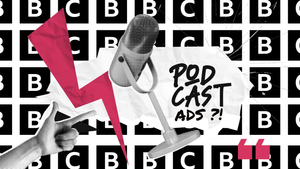A group of 20 media companies and organisations have written to UK Culture Secretary Lucy Frazer to formally criticise the BBC’s proposal that it start selling advertising alongside its podcasts when they appear on third party platforms like Spotify and Apple Podcasts.
Doing so, says the open letter, would likely have “a significant adverse impact on fair and effective competition in the UK podcast market”.
The BBC competing with commercial players for podcast advertising budgets, it adds, “will make it even more difficult for producers, broadcasters and publishers to generate a reasonable return on their investment, while generating income for the BBC that is unlikely to make a significant contribution to its overall budget”.
With the BBC's core licence fee funding having declined in recent years in real terms - and some reckoning that the licence fee should be phased out entirely in the relatively near future - BBC bosses are having to consider other ways to generate income.
One proposal is that, via its commercial division BBC Studios, the BBC sell ads around its podcasts when they appear on other platforms. The same podcasts would continue to be available ad-free within the BBC Sounds app.
It's not surprising that other media companies who also rely on advertising to fund their podcasting output are not impressed with the proposal. Among those signing the letter to Frazer are radio companies Global and Bauer, newspaper publishers DMG, News UK, The Guardian and The Telegraph, plus some bespoke podcast companies like Goalhanger and Podmasters.
Although podcasts have surged in popularity in recent years, generating income from such content remains a challenge. The letter says “podcasting has seen strong growth in recent years, with the choice and quality of content available helping to drive more listening and higher revenues”. However, in the UK “advertising revenue is already underdeveloped compared to other countries”, with total revenues generated by podcast advertising in 2022 at around £76 million, compared to the BBC's total income of £5.7 billion.
“The BBC’s presence already distorts this market when compared to almost all other countries”, the letter claims. And the BBC selling ads around its podcast content would create further challenges. It would also give BBC Sounds an unfair competitive advantage over the other podcast platforms, in that people would be more likely to listen to BBC content in the broadcaster’s own app if that was a way of avoiding being exposed to ads.
The BBC actually already sells advertising around some of its content via BBC Studios, in particular with the UKTV channels that it operates. However, says the letter, that’s different, because those channels mainly air archive programmes, are run separately from the core BBC operations, and exist to make money rather than meet the BBC’s public service obligations. With podcasts, the BBC is proposing to sell advertising around its new public service content.
The letter then notes that BBC funding at large is under review, but expresses deep concern about any plans for the BBC to fund its core output through advertising sales, suggesting that the podcasts proposal could be a sneaky first step to achieving that. “We do not believe that such significant changes should be introduced incrementally and by stealth”, they write.
Concluding, the letter asks Frazer to review the BBC's podcasting proposal - and the concerns it raises - as “a matter of urgency”, adding that it would be helpful if media regulator OfCom would conduct “a review of the audio and podcast market in the UK, both the content itself and the platforms on which they sit, with a focus on the impact of the BBC”.

